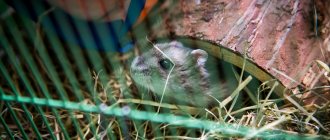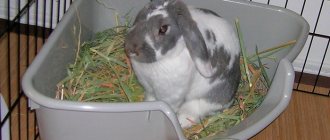- home
- Acquisition
31.03.2018
Pet breeders often face the problem of unpleasant odors. There can be many reasons for its appearance, from improper maintenance to illness of the pet. An unpleasant aroma does not depend on the size or breed of the pet; dungeon hamsters, Syrian hamsters and other species can stink.
Do hamsters stink?
There is no dependence on the breed. In terms of cage care, Syrian hamsters, Djungarian and other breeds are equivalent. Their home needs to be cleaned with equal frequency - at least twice a week.
Important! The Syrian breed is larger than the Dzungarian breed, which is why such a hamster produces more waste. However, when it comes to odor, it is not the quantity that is important, but the “age” of the accumulated feces. They begin to stink after a few days, and it is the same for all breeds.
Similarly, the hamster’s smell is not affected by its gender and age. Males and females are equally clean. Caring for them is the same, and the animals themselves carefully monitor the cleanliness of their coats.
If the cage is clean, then there is nothing to stink.
Hamster smell: reasons and prejudices
Many rodent breeders are interested in whether their pet will smell. Most people think that small rodents, including hamsters, smell bad. At the mention of these pets, some people frown in disgust and exclaim in bewilderment how one can love animals that emit such specific aromas.
Let's try to figure out whether this is actually the case. Hamsters are one of the cleanest pets. They are fans of cleanliness. They are those pets who wash themselves all day long. Hamsters cannot match the length of time they spend hygienically grooming themselves, even with domestic cats, who are clean cats.
A bad smell from a pet can only be the fault of owners who do not care for their animals.
Despite the fact that rodents are clean, sometimes the cage where they live can smell bad. There are several explanations for this state of affairs.
What to do if your hamster smells like urine
If the smell from your hamster leaves much to be desired, you need to understand the situation. There are not many reasons, and all are usually easily remedied.
Uncleaned cage
To line the tray, use a special filler for rodents, but in no case should newspapers or napkins be used. The fact is that paper, unlike filler, is not able to “lock in” the unpleasant smell of urine.
The reason why your hamster stinks may be due to irregular cleaning of his house. It is important not only to shake out the old bedding, but also to wash the tray itself, as well as the pet’s drinking bowl, feeder, and toys. If you do this at least twice a week, then the cage and the hamster itself will not smell. After all, a stinking odor can also be emitted by food debris that has clogged up in the bedding and corners of the home.
Important! There is no need to bathe the animals themselves; they carefully take care of themselves from birth and do not need bathing.
Stress and health problems
When a pet is just settling into its cage after being purchased from a pet store, this is a difficult time for it. You need to give him a few days to adapt. You should not pick up a hamster - both for adult family members and for children. Otherwise, unpleasant consequences may appear. Due to stress, the domestic rodent begins to mark its house. And then the smell, of course, will appear.
In a situation where the animal is very nervous, it needs to somehow calm down. The easiest way is to surround yourself with your own scent. This happens with hamsters too. It is best to leave your pet alone for a while, then the smell will disappear sooner.
Other reasons can be sources of stress: mating fights between males, the spring rutting season, as well as some kind of disease. If your pet starts marking everything in its house for no apparent reason, you should consult a veterinarian.
Common Causes
Since under natural conditions hamsters do not emit fetid odors, in a home environment, a stinky odor most often appears as a result of poorly organized care for the ward. Owners often think little about the cleanliness of their rodent's home, mistakenly believing that periodic care will be sufficient. Practice shows the opposite: it is necessary to take care of the animal’s cage every day.
Just a general cleaning once a week is not enough here, since the hamster’s toilet needs daily cleaning. The sanitary area produces unpleasant odors, which are a consequence of poor-quality bedding material. For example, pieces of newspaper or scraps of plain paper, which are instantly saturated with waste, but do not have the properties of retaining the “fragrance”. Similar materials include various rags or scraps of hay. These materials are not able to retain odors and absorb moisture while remaining dry.
If paper and rags are used as bedding, they must be replaced with clean analogues every day to completely eliminate the stench. And the most ideal option is special toilet fillers, which do an excellent job of removing odors and moisture.
In addition to external reasons, you should pay attention to the health of the hamster. An animal can emit an unpleasant aroma if it has to be nervous and restless. As a rule, stressful situations can be triggered by moving a rodent to a new cage or moving to a new place of residence. In this case, the hamster must be reassured by creating conditions of comfort and calm for him. Do not disturb him with loud noises and periodically pick him up to communicate with the animal.
The appearance of an odor is also possible due to the presence of previously unfamiliar aromas for the rodent. It is quite possible that hamsters, including Syrian ones, react in this way to the presence of other animals in the apartment, and sometimes to the owner himself. This reaction is explained by the animal’s low level of trust in relation to the owner or by the perception of extraneous aromas that are alien to the rodent. In this case, the animal tries to drown out everything foreign with its odors, provoking the corresponding reactions of the body, in the hope of creating comfortable living conditions for itself.
Try to place the cage with the animal in a room where you can always provide a flow of fresh air, but without drafts. In the case of foreign odors, it is necessary to protect the hamster from them and ensure that the animals are kept away from the cage with the rodent. If the hamster's reaction is due to the owner's new smells, you need to give him time to get comfortable and get used to it. Gradually, the hamsters stop defending themselves and the air becomes fresh again, without any foreign impurities.
A common cause of a bad-smelling hamster can be food that is not collected on time. Since rodents tend to stock up on provisions, sometimes the owner may not take care of the supplies, which over time begin to deteriorate, creating a stench. Carefully inspect the cage for food storage, especially if the hamster has a special house with drawers, where it is very convenient not only to hide, but also to hide various foods from prying eyes. Regularly remove uneaten food scraps from the cage, as they will suffer the same fate. In addition, if an animal accidentally eats a piece of old, expired food, the risk of poisoning increases.
Djungarian hamsters, including fellow species, can emit unpleasant odors in case of problems with the gastrointestinal tract and indigestion, which are accompanied by diarrhea, rumbling in the rodent’s tummy and extremely unpleasant “fragrances”. You can try to put your hamster on a therapeutic diet, carefully preparing the diet and completely eliminating food that easily provokes light stools and has a detrimental effect on the functioning of the stomach and intestines of rodents.
Disturbed metabolic processes in the body, enteritis, diabetes or possible inflammatory reactions play a major role. Pay attention to the condition of your rodent's fur and, if it is not in the best shape, and the hamster shows lethargy and apathy, this may be a signal of serious problems. If odors occur, do not delay going to the veterinarian, since small animals thus signal to the owner that there is a problem in the body. Contacting the clinic will help quickly establish the causes or diagnosis, which will allow the hamster to improve its health and stop emitting disturbing aromas to others.
How to prevent unpleasant odors
A few simple tricks will help reduce the time spent cleaning up after your hamster. It is impossible to do without this, of course. But every owner of these cute animals can make their life easier and remove the smell of hamsters.
Toilet training your pet
In a habitable house, the hamster usually chooses one corner (usually away from the drinking bowl and sleeping area) to relieve its natural needs. You can put a small tray with filler in this place. The first time the tray is sprinkled with already soiled filler, so as not to frighten the animal. This technique will help make the cleaning process a little easier.
It can be divided into daily and “general” - with washing the entire house, when the smell of hamsters is completely removed.
Important! The rodent does not immediately learn to allocate a separate corner for a latrine. It will take him 1–2 months to do this after moving into the cage.
Choosing the right filler
Corn litter is best suited for hamsters, since it is the type of litter that reliably blocks the smell of urine. With him, you will only have to clean the cage once every 10–14 days. Every week you have to clean out the wood filler (shavings, sawdust, pressed pellets).
Interesting! Small sawdust is not very suitable, as rodents love to scatter them, and the area around the house will always be dirty. But the worst thing is paper; it is usually its use as a filler that accounts for stinky hamsters.
Proper cage cleaning
You shouldn’t look for the reason why hamster urine stinks; this fact should be taken for granted. The task of the animal owner is to provide him with decent living conditions.
Washing the cage, toys, drinkers and feeders, as well as the tray should not be done with chlorine bleach: even a small residue can be fatal for a tiny animal.
It is much safer to use a special shampoo for hamsters. If you clean regularly, it is not difficult to do.
Important! Cell size matters. If the house is small, then you will have to clean it more often. If you don’t have enough time for frequent cleaning, you should buy a larger home.
During cleaning, the animal is placed in a safe place. It is best to use a jar or carrier.
Hamsters living in a cage that is regularly cleaned by their owners do not smell of anything. The appearance of such a problem indicates two main reasons: cleaning is not done often enough, or the rodent is sick. With careful care, these animals do not cause any trouble, but they delight you with an endless stream of positive emotions.
Food
Perishable foods are the main reason why hamsters smell bad. And it doesn’t matter whether they are Dzungarians or Syrians. Old food always gives off an unpleasant odor, and the animal should not be blamed for this. Try to give your furry only fresh food. Do not forget that this rodent of the Khomyakov family will hide it for the future, and in secluded places. Give fresh perishable foods in small portions so that they do not remain. This way you can get rid of the unpleasant odor.
Moreover, this is important for the health of the rodent itself. The rodent will transfer the remaining food to storage, where it will safely rot and decompose. Imagine - this is a real breeding ground for harmful bacteria and unpleasant odors. If a rodent eats such food, it may become poisoned, which will result in an unpleasant odor coming from the cage.











